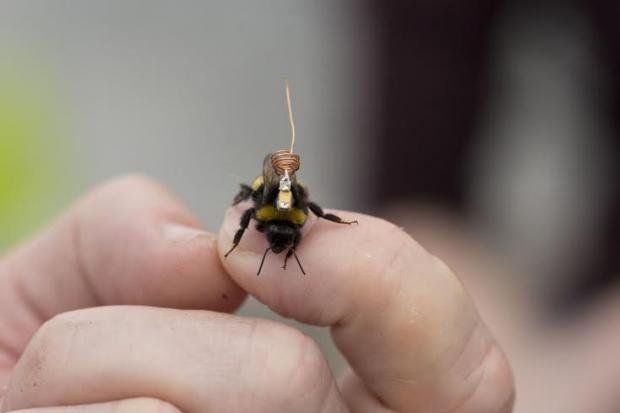A worker bee seen with a tracker attached to its back. Photo by RBG Kew
LONDON, March 26 (UPI) -- Measuring just 4.8 millimeters by 8 millimeters, bee backpacks can't hold much of anything. But strapped to the back of bees, scientists hope they can help solve the mystery of bee decline.
The backpacks are not backpacks at all, but tiny microchips -- each designed to emit a unique signal to be picked up by local detector units. Data fielded by the detector units will be collected and organized by the scientists, enabling them to plot the behavior of the bees -- where they congregate, what flowers they prefer, how far they travel for food.
The project is being organized by ecologists at Kew Gardens -- the Royal Botanical Gardens in Kew, a suburb of London.
"Although tracking technologies exist they are limited by size, range and reliability and until now, tags with mid to long range detection were too large to be carried by honeybees and worker bumblebees and have been used on larger insects and birds," Kew scientist Sarah Barlow explained in a press release.
"These tags are a big step forward in radio technology and no-one has a decent medium to long range tag yet that is suitable for flying on small insects," Barlow added. "This new technology will open up possibilities for scientists to track bees in the landscape. This piece of the puzzle, of bee behavior, is absolutely vital if we are to understand better why our bees are struggling and how we can reverse their decline."
The tags will be placed exclusively on wild bumblebees, a species scientists say are declining as a result of shrinking wildflower populations. And while the research may not offer direct evidence of colony collapse disorder (the affliction of agricultural honeybees), the two insects share a number of threats -- including pesticides, insecticides and parasites.
The backpacks are glued to the backs of bees after the insects spend ten minutes in a chilled environment. The cold temperatures cause the bees to become momentarily docile. Each tracker weighs less than the weight of the bee, and scientists don't expect them to affect the insect's flying abilities. As of now, they've only been affixed to worker bees.
"If an animal ate one, I guess it would have a tracker in its stomach," inventor Mark O'Neill told the BBC. "But the attrition rate for field worker bees is very low. Most die of old age -- they are very competent, and good at getting out of the way."
For now, the bees are only tracked within the confines of the expansive Kew Gardens, but scientists hope the technology will soon allow them to track bees in the wild.















